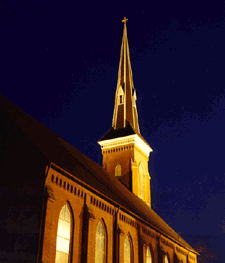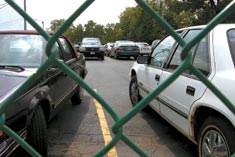More about churches
The Cleveland Free Times has an article about churchly actions in Cleveland, "God's Country: Churches and their parking lots dominate some East Side neighborhoods. It’s a mixed blessing at best." There was a comment on my post about Shiloh Baptist Church ("Losing my religion: Shiloh Baptist Church and Neighborhood Destabilization"), that I just ran across:
(slightly edited) from Andy--
It seems that most of your comments about churches are negative. Churches often are a vital part of a community and a resource for neighborhood.
I would like to point out one church that did "get it". Luther Place Memorial Church (on Thomas Circle) had acquired land behind the church that was at one point destined to become nothing more than a parking lot. Yet after the riots that followed the assassination of Martin Luther King, the church realized that it needed to reach out to the community.
While it took many years, the final outcome was the creation of N Street Village which provides housing (and many other services) to homeless and low-income women. It has proven to be a wonderful success that should be a model for others.
I am sure that there are other churches that recognized the meaning of being an urban church and have acted responsibly. I hope that you will be able to promote the churches doing good work in addition to critiquing those that need to change.
_____
Andy makes a great point. If I were religious, Luther Place may well have been my church. Other churches in the city, such as New York Avenue Presbyterian, Western Presbyterian, the Washington Ethical Society, Quakers, etc., do important work.
What I am most concerned about though is the effect and impact of churches in neighborhoods, particularly those neighborhoods that need help to lift themselves up. And there, the story is more negative, similar to the story in Cleveland. I won't repeat my arguments...
Interestingly enough, Cleveland has one of the most kick butt Community Development Corporations in the country, and it is church-affiliated, the Famicos Foundation. They take on some of the most challenging projects in the city, and they succeed, because of their dedication and faith. And the Cleveland Restoration Society has a historic churches initiative that provides architectural lighting for church steeples, which makes for some majestic views around that city.
 Trinity Lutheran Church, Ohio City, Cleveland, church steeple lighted through the CRS program.
Trinity Lutheran Church, Ohio City, Cleveland, church steeple lighted through the CRS program.And just so you know, I actually love church architecture and stained glass windows. In fact, when I was involved in H Street stuff a lot more than I am now, one of my ideas was to try to work it out to light at night the stained glass windows of Douglass Memorial Methodist Church (at 11th and H Streets NE) to add more warmth to the corridor.
Because our real estate market is changing, the problems experienced in Cleveland are lessening in DC. From "God's Country:"
“You have a large number of churches,” Stone says, “[but] you don’t have a huge economic return … Churches aren’t businesses selling tangible goods, so there is no job creation.”...
In the late 1990s, the church’s staff started buying vacant land parcels around its perimeter. This wasn’t difficult, as lots open to decline became a bargain hunter’s paradise. But there were consequences. Every Sunday, the church’s staff and congregation would return to find litter and remnants of drug activity, Haughton says. Before parishioners arrived on Sunday morning, needles, trash, beer cans and liquor bottles had to be swept away by a volunteer crew.
Over the years, as more worshipers found their way to the Church of Christ, the church needed more space. First, it came in the form of parking lots. Then the church considered grander plans that would eventually become its $6 million facility that opened in 2002.
Today, the Church of Christ has more than 3,000 members, and it has six parking lots. With membership still growing — from outside Glenville, and as far as Akron and Elyria — even that won’t be enough...
BACK IN MT. PLEASANT, resident Diane Coates is irate. An activist and the owner of a local copy shop, Coates openly questions why there are so many churches around her and why they seem to do nothing.
"It’s not just the parking lots,” she says. “Those churches, those doors are shut [most of the week]. They open on Sunday for a few hours, and on Wednesday for Bible study.”...
"Some churches don’t like to be part of organized efforts to address ills of the community,” Tatum says. “And some churches don’t have any desire to deal with the social ills, they don’t feel that’s their calling. They preach within their four walls and that’s enough for them.”...
Kirksey says that with the rest, discussions usually go nowhere. “I have no authority to do anything,” she says. “The city needs to get involved with zoning and design restrictions, so you don’t have block after block of parking lots.”
 Providence Baptist Church. Big Lots, but the church is short on parking spaces. Cleveland Free Times photo.
Providence Baptist Church. Big Lots, but the church is short on parking spaces. Cleveland Free Times photo.The church parking lot issue is simply not high on the city’s list of priorities, Kirksey says. “It’s in our neighborhood. We see it everyday. It’s not as important for the city.” A Lee-Miles community organizer who declined to be named suggests that it’s not apathy but willful ignorance. “Politically, it’s suicide,” the activist says. “If you think about churches, for councilmen or anyone in City Hall, they won’t touch it because automatically people will say they’re against churches.”
But Cleveland Planning Director Bob Brown says that neither politicans nor community activists have brought these matters to his attention. “We can only know of a problem if the community organization comes and asks us” for help, he says.
And there are possible solutions. In the Buckeye neighborhood, for example, Brown says a new zoning district going into effect will be both pedestrian- and retail-based, with no houses or churches allowed on the ground level. “It’s the only neighborhood in the city that has requested that kind of zoning,” Brown says. ...
In addition to rewriting zoning ordinances, there are other solutions on the table as well, at least one of which is being considered by Haughton and the Church of Christ in Glenville. Instead of buying up vacant lots or tearing down abandoned buildings to produce surface parking, the city can also help churches think about tiered parking, underground lots, and shared parking with businesses that close on Sundays.
The latter is what Church of Christ’s Haughton hopes to do. His church is in talks with businesses — and the church even has preliminary blue prints ready — for plans to share parking on Sundays. “That’s better for the neighborhood,” Haughton says, “because you don’t want blocks and blocks of parking.”



0 Comments:
Post a Comment
<< Home